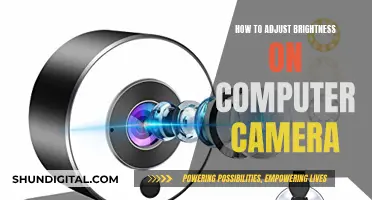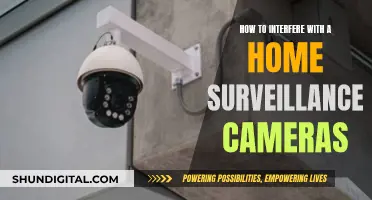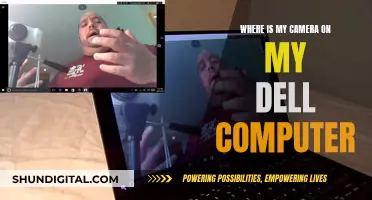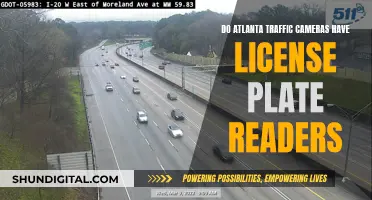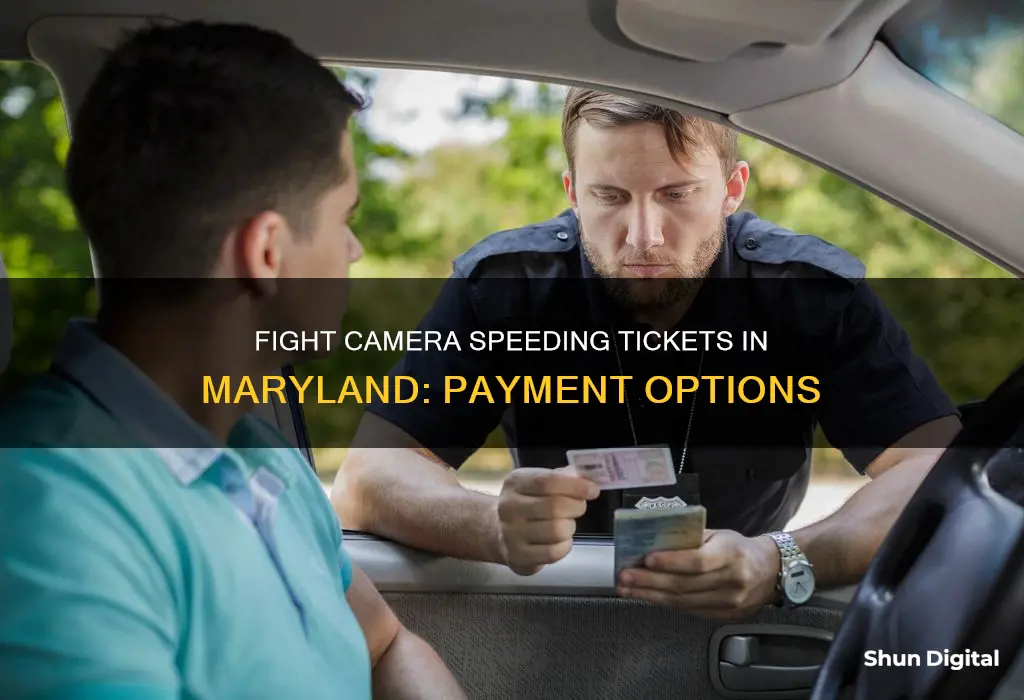
If you've been caught speeding by a camera in Maryland, you'll receive a ticket in the mail, which includes a copy of the violation, photographs, and the speed your vehicle was traveling at. You have several options for how to pay the ticket, which carries a $40 fine. You can pay online, by mail, by phone, or in person. If you don't pay the fine on time, it will increase substantially. If you want to contest the ticket, you can do so in court, and you may be able to get a reduction in fines or have the citation dismissed.
| Characteristics | Values |
|---|---|
| Ticket Issuing Criteria | Driving at least 12 miles above the speed limit |
| Ticket Contents | Photographs of the incident, license plate, and speed |
| Ticket Payment Methods | Online, by mail, by phone, or in person |
| Ticket Payment Locations | Montgomery County Police Department, Burtonsville, or Rockville |
| Ticket Fine | $40 |
| Ticket Fine Payment Deadline | Not specified; late payments may result in additional fees |
| Ticket Type | Civil violation, similar to a parking violation |
| Points on License | No |
| Insurance Provider Notification | No |
| Contesting Ticket | Possible; must be done at least five days before the due date of the fine |
| Contesting Ticket Location | Maryland District Courts |
What You'll Learn

Paying online, by mail, by phone, or in person
Paying online
You can pay your safe speed camera ticket online at the Online Payment Website. A non-refundable convenience fee applies.
By mail
You can pay by mailing a check or money order, made payable to Montgomery County, MD, to the following address:
Automated Traffic Enforcement
P.O. Box 10549
Rockville, Maryland 20849
Write the citation number and license plate number on your check or money order to ensure proper credit. Returned checks are subject to electronic redeposit for the face amount and a fee of $35. Do not send cash.
By phone
You can pay by phone by calling (800) 492-2656. You will be directed to an automated system where you can follow the prompts to pay. Have your ticket number and credit card ready.
In person
You can pay your safe speed ticket in person at one of two locations:
4040 Blackburn Lane, Suite 200, Burtonsville, MD 20866
Monday to Friday, 8:00 am–5:00 pm (except county holidays)
Cash, check, money order, Visa, or Mastercard accepted
27 Courthouse Square, Suite 200, Rockville, MD 20850
Monday to Friday, 8:00 am–4:30 pm (except county holidays)
Cash, check, money order, Visa, or Mastercard accepted
Disposing of Camera Batteries: A Safe Guide
You may want to see also

Requesting a hearing
If you receive a camera speeding ticket in Maryland, you have the option to pay the fine, plead guilty with an explanation, or request a trial. Here is a step-by-step guide on how to request a hearing:
- Review Your Options: When you receive a payable traffic citation in Maryland, you have several options, including paying the fine, requesting a payment plan, pleading guilty with an explanation (waiver hearing), or requesting a trial. Carefully review the options on your citation and choose the one that best suits your situation.
- Understand the Timeline: In most cases, you must take action within 30 days of receiving the citation. Whether you are requesting a waiver hearing or a trial, make sure to submit your request within this timeframe to avoid any negative consequences, such as driver's license suspension.
- Prepare Your Documentation: If you are challenging the citation, gather any relevant documentation or evidence to support your case. This could include photographs, witness statements, or any other information that may help prove your innocence or mitigate the charges.
- Submit Your Request: To request a waiver hearing, check the "Request a Waiver Hearing" box on the citation. Sign and date the ticket, and mail it to the District Court Traffic Processing Center at the provided address: District Court Traffic Processing Center, P.O. Box 6676, Annapolis, MD 21401. For a trial, check the "Request a Trial" box, sign and date the ticket, and mail it to the same address.
- Await Your Court Date: After submitting your request, the court will schedule a hearing or trial date. You will be notified of this date, and it is important to mark your calendar and plan to attend.
- Present Your Case: During the hearing or trial, you will have the opportunity to explain your side of the case to the judge. If you have any witnesses or additional evidence, make sure to bring them to court. The hearing officer who issued the citation may also be present to provide their testimony.
- Understand the Outcome: Following the hearing or trial, the judge will make a decision. If found guilty, you may have the right to appeal the decision within a certain timeframe. If you are not found guilty, the case will be closed, and you will not face any further penalties.
Remember, when dealing with a camera speeding ticket in Maryland, it is important to act promptly and carefully consider your options. Requesting a hearing allows you to present your side of the story and potentially reduce or waive the fine or plead your case for a "not guilty" verdict. Always follow the instructions provided on your citation and seek legal advice if needed.
Samsung Galaxy S10: Night Mode Camera Feature Explained
You may want to see also

Appealing the ticket
If you receive a speed camera ticket in Maryland, you have the right to appeal it. Here is a step-by-step guide on how to contest your ticket effectively:
Requesting a Hearing:
When you receive a speed camera ticket, it will include information about the violation and instructions on how to pay the fine or contest the ticket. If you choose to contest the ticket, you must request a hearing. This can usually be done by mail, online, or by calling the provided contact number on the ticket. It is important to act promptly and request a hearing within the specified timeframe, typically within 30 days from the date of the citation, to avoid additional penalties or fees.
Gathering Evidence:
Collect any evidence that supports your case, such as photographs of the area where the violation occurred, maintenance records of the speed camera, or statements from passengers or witnesses. You can also challenge the accuracy of the speed camera by requesting maintenance and calibration records to determine if the camera was functioning correctly at the time of the violation.
Signage Issues:
One of the common defenses against a speed camera ticket is to argue that the signage indicating the speed limit or the presence of the speed camera was missing, obscured, or incorrectly placed. Take photographs of the current state of the signage to support your claim.
Mistaken Identity:
If you believe that the camera captured the wrong vehicle, gather evidence to prove that you were not driving in that area at the time of the violation. This may include a certified statement from your employer or documentation from a medical professional.
Presenting Your Case:
Prepare your presentation by organizing your evidence and arguments clearly and concisely. Practice your statements to ensure you cover all relevant points effectively. At the hearing, the judge will examine the evidence and listen to both your argument and the prosecution's case. They may ask questions to clarify any points.
Outcome Decision:
Based on the presented evidence and arguments, the judge will decide whether to uphold the ticket, reduce the fine, or dismiss the ticket entirely. If you are found guilty and wish to appeal the decision, you have the right to do so within 30 days of the ruling.
It is important to note that contesting a speed camera ticket in Maryland can be challenging, and you may benefit from consulting or hiring a traffic violation attorney to assist you in building your case and navigating the legal process.
Storing Camera Batteries: Charged or Not?
You may want to see also

Contesting the ticket in court
Contesting a camera speeding ticket in Maryland involves challenging the validity of the ticket and presenting your case in court. Here's a comprehensive guide on what to expect and how to navigate the process effectively:
Requesting a Hearing:
When you receive a camera speeding ticket, you will find information on the violation and instructions on how to pay the fine or contest the ticket. If you decide to contest the ticket, you must request a hearing. This can usually be done by mail, online, or by calling the provided contact number on the ticket. It is crucial to act promptly and request the hearing within the specified timeframe, typically within 30 days from the date of the citation, to avoid additional penalties or fees.
Gathering Evidence:
Start collecting any evidence that supports your case, such as photographs of the area where the violation occurred or maintenance records of the speed camera. Obtain statements from passengers or witnesses who can corroborate your version of events. Additionally, gather all relevant documentation, including the ticket, your vehicle registration, and any correspondence related to the ticket.
Challenging the Accuracy of the Camera:
One of the key strategies in contesting a camera speeding ticket is to challenge the accuracy of the speed camera. Request maintenance and calibration records to determine if the camera was functioning correctly at the time of the alleged violation. If the camera was not properly maintained or calibrated, the recorded speed may be inaccurate, which strengthens your case.
Addressing Signage Issues:
Another line of argument is to focus on signage issues. Argue that the signage indicating speed limits and the presence of speed cameras was missing, obscured, or incorrectly placed. Take photographs of the current state of the signage to support your claim. This argument hinges on ensuring that all signage complies with legal standards, which is crucial for the validity of speed camera tickets.
Proving Mistaken Identity:
If you believe the camera captured the wrong vehicle, gather evidence to support this claim. Prove that you were not driving in that specific area at the time of the violation. This may involve providing detailed records of your whereabouts or statements from witnesses who can attest to your location at the time.
Presenting Your Case in Court:
Prepare a clear and concise presentation of your evidence and arguments for the hearing. The judge will examine the evidence and consider both your argument and the prosecution's case, possibly asking questions for clarification. Based on the presented evidence, the judge will make a decision to either uphold the ticket, reduce the fine, or dismiss the ticket entirely.
Working with an Attorney:
Consider seeking legal advice from a qualified traffic ticket attorney or speeding ticket attorney. They can guide you through the process, help you navigate your rights, and increase your chances of successfully contesting the ticket. An attorney can request a hearing, make arguments on your behalf, and provide the judge with compelling evidence to mitigate your violation or get the citation dismissed.
Replacing Li-ion Camera Batteries: A Step-by-Step Guide
You may want to see also

Potential outcomes of contesting the ticket
If you've received a camera speeding ticket in Maryland, you have the option to pay the fine or contest the ticket. Here are some potential outcomes of contesting the ticket:
Due Process and Procedural Errors
Contesting a camera speeding ticket allows you to exercise your right to due process. You have the opportunity to present your case in court and address any procedural errors or mistakes in the ticket issuance. In some cases, tickets may be dismissed due to procedural flaws, such as incorrect information on the citation or improper issuance practices.
Challenging the Accuracy of Evidence
Speed cameras, like any technology, can make mistakes due to calibration issues or technical glitches. By contesting the ticket, you can challenge the accuracy of the evidence presented against you. You can request maintenance and calibration records of the specific camera to verify if it was functioning correctly when the alleged violation occurred.
Signage Issues
For speed camera tickets to be valid, proper signage must be in place to inform drivers of speed limits and the presence of speed cameras. By law, speed cameras in Maryland are required to be placed in specific areas, such as residential neighborhoods, school zones, and construction sites. If the signs were missing, obscured, or placed incorrectly, you have grounds to contest the ticket.
Protecting Your Driving Record
Although camera speeding tickets in Maryland do not add points to your license, maintaining a clean driving record is still crucial. Contesting the ticket can help you avoid any negative marks, preserving your driving history and potentially avoiding future complications, such as increased insurance premiums or difficulties in obtaining loans or financial services.
Financial Implications
Contesting a camera speeding ticket can help you avoid paying the fine and any additional penalties or late fees that may accumulate over time. If the judge rules in your favor, you may be able to reduce or eliminate the financial burden associated with the ticket.
Camera Tickets: Legal in Tennessee?
You may want to see also
Frequently asked questions
You can pay a camera speeding ticket in Maryland online, by mail, by phone, or in person.
A camera speeding ticket in Maryland is a civil violation, similar to a parking violation. The fine is $40, and there are no points assigned to your license or criminal ramifications. Insurance providers are not notified of these citations.
If you want to contest a camera speeding ticket in Maryland, you must sign and mail the ticket to a P.O. Box within 30 days of receiving the citation. You will then have the opportunity to present your case and any evidence in court.
If you fail to respond to a camera speeding ticket in Maryland, you may be subject to additional fees and penalties. Your driver's license may also be suspended if you do not respond within 30 days.



